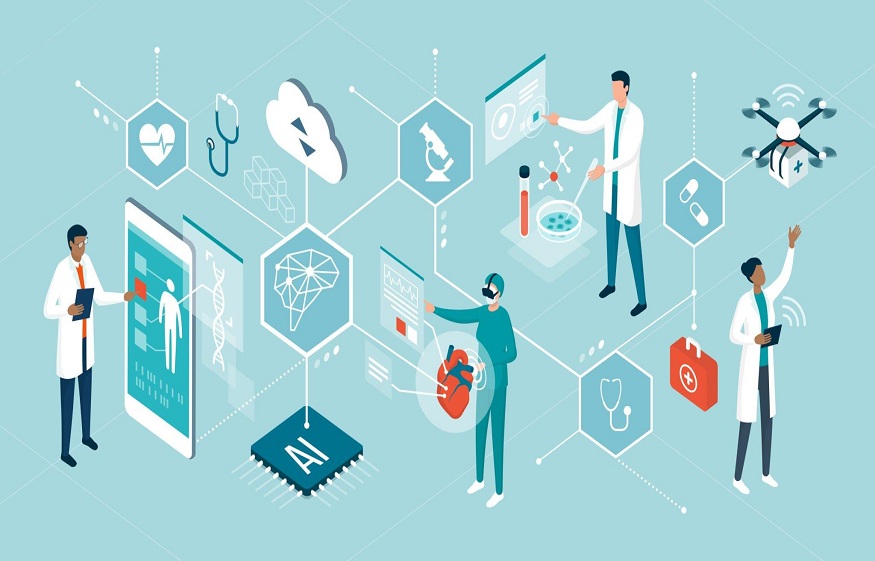Healthcare practitioners can get a lot of help from marketing when it comes to creating, communicating, and giving worth to their target market.
Most of the time, modern marketers start their study and planning with customers, not goods or services. They care more about building a long-term relationship than about making a specific transaction go smoothly.
They want customers to be happy with their purchases so that they will keep buying from the same seller. Marketers have used many tried-and-true methods in the past, such as market research, product creation and development, distribution, pricing, advertising, special sales, and sales management.
To get people to pay attention to messages and deals, these methods need to be paired with new methods that use new technology and new ways of thinking.
The way a company runs its business in response to things happening outside of it is called its marketing plan. In a more concrete way, medical marketing strategies are plans for how to act that are based on an analysis of external factors.
The marketing policy lays out the broad plan that will be used to carry out the whole activity, which will include a number of different strategies.
What is healthcare marketing?
Health marketing is a way to improve public health that uses both traditional marketing theories and methods and scientifically-based tactics to protect and improve the health of many different types of people.
It involves coming up with, spreading, and delivering messages to the general public about ways to avoid, promote, and keep people healthy. This is one way that new medical and health-protecting services, like insurance, are brought to the attention of a large number of people.
Roles of marketing in healthcare industry
Marketing plays an essential role in the healthcare industry. It involves the promotion of healthcare products and services to patients, healthcare providers, and other stakeholders.
Healthcare marketing helps to improve patient outcomes, increase revenue for healthcare organizations, and enhance brand recognition. We will discuss the various roles of marketing in the healthcare industry.
1. Patient education and engagement
One of the primary roles of marketing in healthcare is to educate and engage patients. Through marketing campaigns, patients can learn about various healthcare services, treatments, and preventive measures.
Marketing can also help to promote healthy behaviors, such as regular check-ups and screenings. Healthcare organizations can use various channels such as social media ads, email, and websites to communicate with patients and provide them with useful information.
2. Building trust and credibility
In the healthcare industry, trust and credibility are critical factors in determining patient satisfaction and loyalty. Marketing plays a significant role in building trust and credibility among patients.
Healthcare organizations can use marketing campaigns to showcase their expertise, experience, and commitment to patient care. They can also use patient testimonials and case studies to demonstrate their success in treating various health conditions.
3. Brand recognition
Marketing is also essential for creating brand recognition and awareness in the healthcare industry.
A strong brand identity can help healthcare organizations stand out from the competition and attract new patients.
Marketing campaigns can help to promote the brand and create a consistent message across different channels.
4. Increasing revenue
Marketing can help healthcare organizations to increase revenue by attracting new patients and retaining existing ones.
Through targeted marketing campaigns, healthcare organizations can reach out to potential patients and encourage them to choose their services.
Marketing can also help to promote high-margin services, such as cosmetic procedures, to increase revenue.
5. Enhancing patient experience
Marketing can also play a vital role in enhancing the patient experience. Healthcare organizations can use marketing campaigns to improve communication with patients, provide them with personalized care, and create a positive overall experience.
Through marketing, healthcare organizations can also gather feedback from patients and use it to improve their services.
6. Building relationships with healthcare providers:
In addition to patients, marketing can also help healthcare organizations to build relationships with healthcare providers.
By promoting their services to physicians, nurses, and other healthcare professionals, healthcare organizations can increase referrals and build a network of trusted partners.
7. Recruitment of healthcare professionals
Marketing can help healthcare organizations to recruit qualified healthcare professionals. By promoting their culture, work environment, and opportunities for professional development, healthcare organizations can attract talented individuals who share their vision and values.
8. Reputation management
Marketing can help healthcare organizations to manage their reputation in the community. Through marketing campaigns, healthcare organizations can address concerns or negative perceptions and demonstrate their commitment to quality patient care.
9. Compliance with regulations
In the healthcare industry, there are various regulations and guidelines that healthcare organizations must follow.
Medical Clinic Marketing can help healthcare organizations to stay compliant with these regulations by ensuring that their marketing materials are accurate, transparent, and do not make false or misleading claims.
10. Market research
Marketing can also play a role in conducting market research to understand patient needs, preferences, and behaviors.
Healthcare organizations can use this information to develop new services or products that meet the needs of their target audience.
11. Crisis management
In the event of a crisis or emergency, marketing can help healthcare organizations to communicate effectively with patients, staff, and other stakeholders.
Through marketing, healthcare organizations can provide timely and accurate information to address concerns and mitigate the impact of the crisis.
12. Advocacy:
Marketing can play a role in advocacy efforts for healthcare policies and regulations that impact the industry.
By partnering with patient advocacy groups and industry associations, healthcare organizations can use marketing to raise awareness and influence policymakers.
13. Digital transformation:
In recent years, healthcare organizations have embraced digital technologies to improve patient care and outcomes.
Marketing can help healthcare organizations to develop and implement digital transformation strategies by promoting the adoption of new technologies and creating digital channels to engage patients.
14. Data analysis:
Marketing can also play a role in analyzing patient data to gain insights into patient behavior, preferences, and outcomes.
By using data analytics tools, healthcare organizations can develop targeted marketing campaigns that are personalized to individual patients.
15. Corporate social responsibility:
Marketing can also play a role in promoting a healthcare organization’s commitment to corporate social responsibility.
By communicating their efforts to support social causes, reduce their environmental impact, and improve the health of the communities they serve, healthcare organizations can build trust and loyalty among patients and other stakeholders.
Final words
Marketing plays a critical role in the healthcare industry. By educating and engaging patients, building trust and credibility, creating brand recognition, increasing revenue, enhancing the patient experience, and building relationships with healthcare providers, clinic marketing can help healthcare organizations to achieve their goals and improve patient outcomes.




